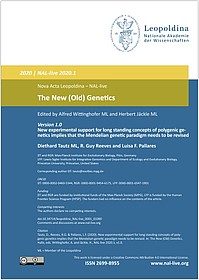NAL-live
The New (Old) Genetics (2020)

Vol. 2020.1
New experimental support for long standing concepts of polygenic genetics implies that the Mendelian genetic paradigm needs to be revised
Diethard Tautz ML, R. Guy Reeves and Luisa F. Pallares
Published by Alfred Wittinghofer, Herbert Jäckle
(2020, 16 pages, 5 Figures, Version 1.0 , ISSN: 2699-8955)
When one thinks of genetics, the first thing that comes to mind is Mendel. Mendel's laws are taught at an early age in school and for many school leavers they remain the only contact with genetics. Yellow and green peas are used to show how traits are inherited, how mixing and splitting can occur. However, while such categorial thinking has fueled the development of modern molecular genetics, it does not reflect the fact that neither the common phenotypes, nor their inheritance, can be described in these terms. Instead, the rules of quantitative genetics apply to most visible manifestations of organisms.
The principles of quantitative genetics have been worked out by a contemporary of Mendel – Francis Galton. Among quantitative geneticists, statistics prevail. There are no categorical distinctions, such as the green and yellow peas, but only continuous distributions, such as body size. With the tools of genomics, it is now possible to determine for each individual gene in the genome what proportion it makes up of a continuous phenotype. Some geneticists now even assume that ultimately all genes in a genome contribute to each phenotype in varying proportions, the so-called “omnigenic model”.
While quantitative genetics teaches that there are no genetic categories, our thinking is still mainly shaped by categories. For example, we understand well how the categories “male” and “female” are determined by the distribution of the X and Y chromosomes according to Mendel's rules. But in quantitative genetics there is no longer just the category male or female, but distributions and overlaps of characters. If our schools had always taught quantitative genetics, this would have prevented many misunderstandings of genetics and inheritance.
doi.org/10.34714/leopoldina_nal-live_0001_01000
A NAL-live article open for comments and discussion. More information
This article is open for online discussion and comments. To engage, click the link on the right.

Dr. Renko Geffarth
Editorial Manager
| Phone | 0345 - 47 239 - 146 |
| Fax | 0345 - 47 239 - 139 |
| renko.geffarth (at)leopoldina.org |
